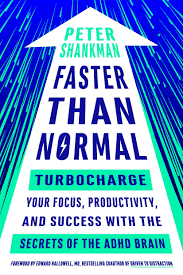
SQUIRREL! As a young teen I was diagnosed with ADHD. I hadn’t thought much about it, but I was able to do things most of the kids couldn’t do – and unable to do some of the things they could. Namely, concentrate on things I didn’t find interesting. I could, however, hyperfocus on things I did find interesting. I’d usually have any and all literature and history books read within the first few weeks of school. I kept up with the rest of my classes just fine, but it was always a struggle with the inevitable words I absolutely hated to hear, “But you have so much potential.” Or, “If only you would apply yourself”.
For years I just dealt with it, one way or another. In school it was medication, which I couldn’t stand. Afterwards, I just “tried harder” or found tools that helped, such as music without distracting words, or finding places I could be free from distraction to do important work or studying. A few years ago I found an audiobook (I listen to a great many audiobooks), entitled “Faster Than Normal” and gave it a listen. I think I’m up to my second or third listen now, but my first since I’ve had a blog, so I thought I’d share some takeaways in being “faster” than “normal” in general and how it effects my approach to real estate in particular
Luckily (or perhaps unluckily when you look up the average income in our industry) I thoroughly enjoy real estate. Enjoying it allows me to hyperfocus. For those unfamiliar with the term, hyperfocus is a deep, intense state which allows me to be far more productive than I usually am – and according to experts, “faster” than the “normal” people who haven’t been blessed with ADHD.
I like to think I lost the “H” somewhere in my twenties. I’m no longer hyper and can hardly remember being hyper – but I can see it in our boys, which is the reason I recently decided to give the book another listen. I also recommended it to my wife with the warning that it could come across as insulting. I don’t really see any reason to look at people who are earnestly trying their best in day to day life as “better” or “worse” than myself, or each other. I think stating that someone is “slower” than you is insulting, however true you may feel (or be able to scientifically prove) that may be.
Anywho, back to the point: how it affects my approach to real estate. I am ALWAYS reviewing and tweaking my tools, my approach and myself for a better, more efficient, effective and enjoyable experience for all involved. I have much of my real estate workflow automated. I digitally track each transaction with reminders popping up to tell me when something is due. I don’t like the idea of a deal falling apart. My client/customer/friend has a vested interest in that deal. I, of course, make a commission when that deal closes – but to be honest, my commission is a pretty minimal decision making factor for me. I truly enjoy what I do. If it were all about the money, I’d work some overtime at my day job and make more per year than I do with real estate. I greatly enjoy helping people. I’ve found that real estate is a way I can help people in a huge way. For the average American, their home is their most valuable asset. For the average entrepreneur, their business real estate is their biggest asset. Helping people with the buying and selling of these assets is the biggest impact I can have with my given interests and abilities.
If you, or someone you love, is blessed with ADHD (even undiagnosed), I highly suggest checking out “Faster Than Normal” by Peter Shankman for both tools to manage it and a good perspective on what it’s like for them and how to grow your relationship stronger by better understanding it.
